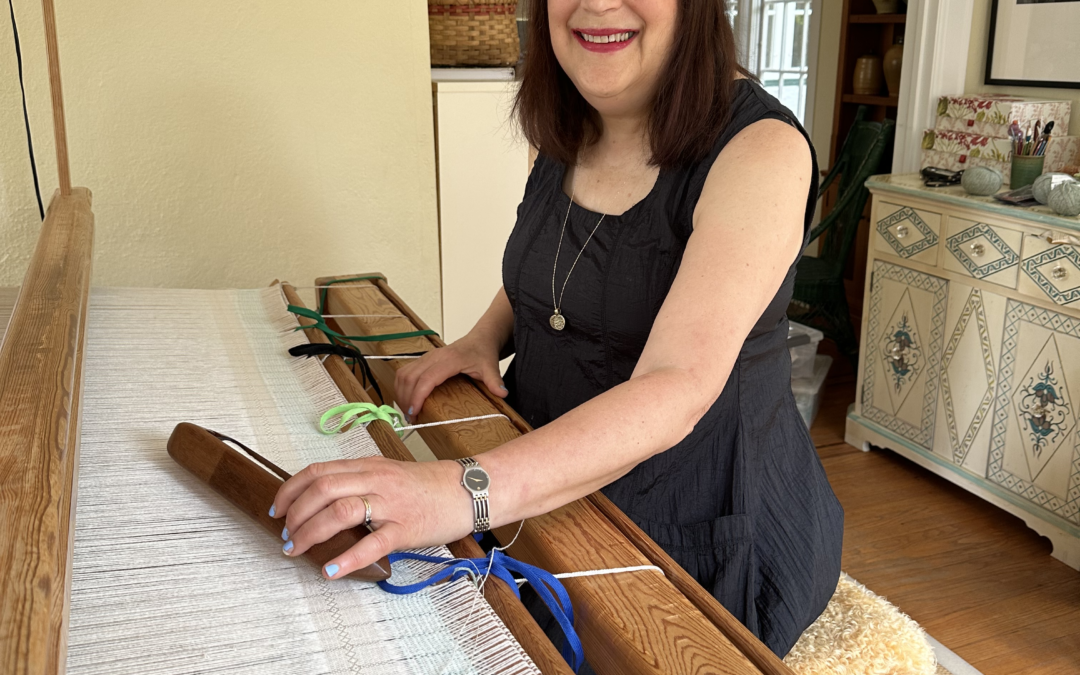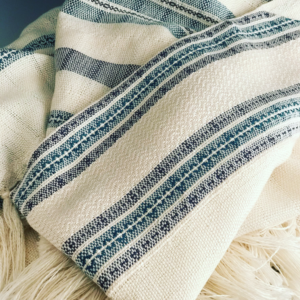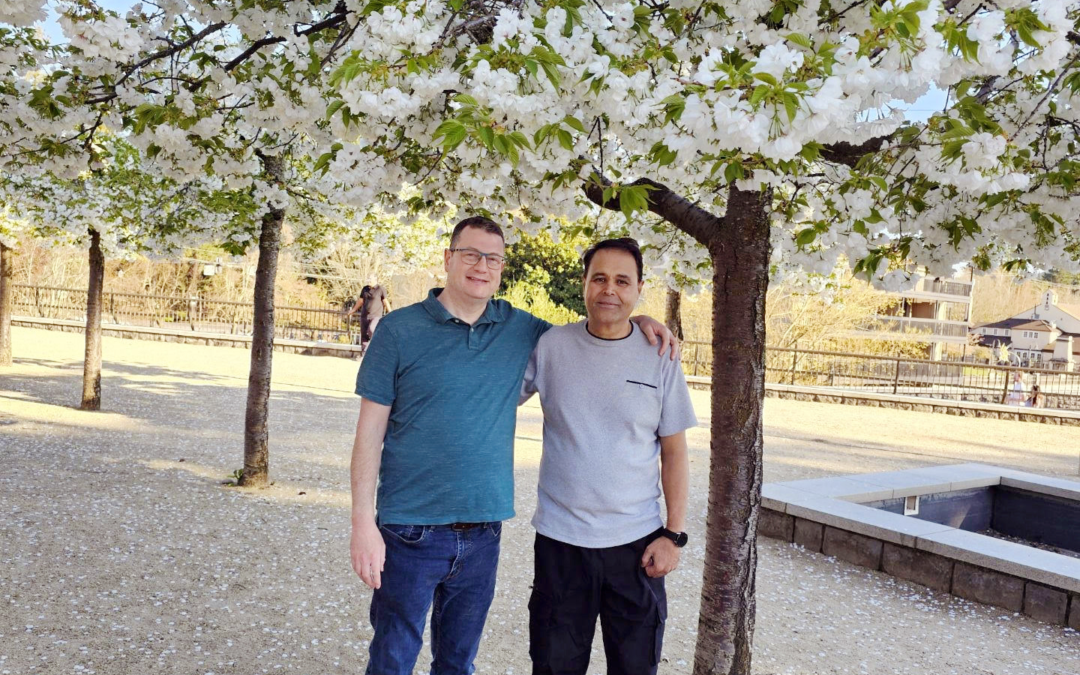
by Ellen Braunstein | Jun 10, 2024 | Arts, Fashion, Visual Arts

Laurie Kimmelstiel weaves Jewish prayer shawls on a traditional Swedish loom. Their softness, their comfort, their beautiful design envelops the wearers, allowing them to focus on prayer and God’s presence.
“It separates them from the rest of the world,” says Kimmelstiel of New York. Her spiritually-guided weaving is informed by hiddur mitzvah, she says, “the concept of creating beautiful Judaica to enhance the observance of Jewish rituals.”
The tallit, she says, should be beautiful, elegant and exceptional, rather than some manufactured fabric, stiff and uncomfortable, that has no meaning.
Kimmelstiel has been creating textile art for 45 years.
Along the way, she has mastered the art of knitting and crocheting, calling it “a source of calm in my life.”
She regularly teaches knitting. At one time, she offered lessons to recovering addicts in workshops organized by BigVision.NYC. “It was probably one of the most rewarding things I’ve ever done. I still keep in touch with a lot of the young people I taught to knit.”
She is co-author of “Exquisite Little Knits” and many of her knitting and crochet designs and patterns have been featured in books and magazines.
Her mainstay though is weaving - custom tallitot for 13-year-olds celebrating their bar and bat mitzvah and people of all ages as well. Some well-known cantors and rabbis wear her tallitot. She also creates tallit bags, chuppahs, challah and matzah covers.

Her customers are worldwide. White Ridge Crafts, as her company is called, is advertised through word of mouth, a Facebook page and an Instagram account.
Kimmelstiel’s mother was a seamstress and sewed most of her daughter’s clothes. Kimmelstiel’s daughter, Rebecca Kevelson, is a knitter who owns a yarn company and is a knitwear designer.
“My interest developed in college. My master’s degree is in American social history and a lot of that has to do with craft,” said Kimmelstiel, who has worked in museums.
She did not learn to weave until she finished graduate school. Along the way, she picked up basic skills in Navajo and African weaving. A nun was one of her great weaving teachers.
“Thirty years ago, I decided to weave a tallit for my husband and that led to tallitot for people in my community who saw his and asked me to make them for their children’s b’nai mitzvah.”

The cost of Kimmelstiel’s custom tallitot range from $800 to $1,500. It takes approximately 50 hours to complete each prayer shawl. “The process of weaving is a long and complicated one,” she shares.
Kimmelstiel meets with her clients for sometimes close to an hour to discuss color and design. “I ask people if there’s something about the parsha they’ll be reading for their bar/bat mitzvah that inspires them.”
She incorporates numbers of stripes, in some cases, 18 stripes on each side, signifying chai or life. “So, the wearer is surrounded by life,” she tells me.
“When it’s a bar or bat mitzvah child, I have them come with family members to tie the last corner of the tzitzit, ritual fringes, as the child puts it on for the first time and says a special prayer for that moment.”
“As a parent,” Kimmelstiel explains, “This is one of the most meaningful times. It’s hard to have this experience or witness a family seeing their child in a tallit before their bar or bat mitzvah and not be brought to tears.”
Kimmelstiel is observant and belongs to two synagogues near her homes in White Plains and Stephentown, New York.
Her husband, Fred, is a surgeon, a potter and a beekeeper. “It’s utterly fascinating and he’s pretty serious about beekeeping. Bees pollinate and are responsible for every kind of plant you can imagine. And honey is the most wonderous substance for our health and well being.”
Kimmelstiel helps with the marketing of Golden Road Honey, which is a big seller for Rosh Hashanah. Weaving and the fiber arts occupy the rest of her time.
“It’s a real labor of love,” she says of the tallitot. “I want people to feel or experience joy, comfort, happiness and spirituality – a connection with our past and traditions.”
For more information about Kimmelstiel hand-woven tallitot and other fiber arts, call her at (914) 260-8860 or email whiteridgecrafts@gmail.com

by Masada Siegel | Jun 5, 2024 | Arts, Celebrity, Featured Slider, Performance

By Masada Siegel
Standing strong for Israel is not the first time comedian Shawn Pelofsky, who has received death threats for her activism, has stood in the line of fire. She was one of the first female comics to perform in Afghanistan after Sept 11.
“When I told my parents that I was going to Afghanistan, my father was very upset because he served in the US Navy as a medic in Vietnam and he begged me not to go,” Pelofsky, always one to make people laugh recalled,“He said, ‘I will pay you what they are paying you.’ I said, ‘Dad this is not about the money, this is about what is right. But while we are on the topic, can you give me ten grand?’”
After October 7, Pelofsky, who lives in Los Angeles, was shaken to the core about the Hamas massacre and the subsequent revolting response of antisemitism exploding all over the world.
“I’ve been in the dark and so naive. I grew up Jewish in Oklahoma where I was always embraced for my heritage by friends from all walks of life.” She explained. “I did not realize how rampant antisemitism is, and since I did not see it in the South, you can imagine how shocked I was to find such overwhelming hate in Los Angeles.”
Pelofsky is one of only a handful of Hollywood personalities who has been outspoken on social media, consequently, she has faced an endless amount of cyber-bullying and antisemitic rhetoric. In every single live performance since October 7, she is unabashedly unafraid to speak her truth and educate her audiences.
“This is the time to speak up. Have those uncomfortable conversations with your friends and neighbors. Most don’t understand why anti-Zionism is anti-semitism. They are silent because many don’t know the history of the Middle East and Israel’s right to exist.” Pelofsky explained. “I have helped some people see the bigger picture. Unfortunately, I have also lost “friends”. Ironically, most of them are from marginalized communities themselves. Believe me, there is no bigger disappointment than when someone like myself who has marched for many different people’s rights and is a pillar to the LGBT community, does not get the support that should be reciprocated.”
Pelofsky takes every opportunity to use her voice each time she steps on stage to combat antisemitism.
“I immediately bring the topic of anti-semitism to the forefront. And with humor, it’s easier to disarm people and then educate them. There is a delicate balance, but I wouldn’t be able to live with myself if I didn’t use this G-d given platform to encourage people to speak up against hate.” Pelofsky joked as she explained, “Also, when the whole audience is focused on how I look like Streisand’s doppelganger, the subject of me being Jewish, whether you want to hear it or not, is going to come up. And you have no choice but to listen. I’m the one with the mic. You’re on my territory now.”
Pelofsky explained how surprised she was that the majority of Jewish artists, producers and directors in Hollywood remain silent.
She asked, “What are they afraid of? Losing followers? That’s just revolting at a time when most of the world is championing Extreme Islamism. And what makes those Jewish people who remain silent or even worse are the Jews who are pro-Palestine and speaking against their own kind? Silent or not, none of us will be standing if this anti-Semitism continues to escalate.”
Pelofsky always speaks her mind. Her message to people everywhere is to be active, contribute to Jewish organizations and stand strong.
“Be loud and proud. Do not hold your head down. Together we are stronger. When we say “Never Again”, we mean NEVER AGAIN!”


by Ellen Braunstein | Jun 5, 2024 | Featured Slider, Interviews, tikun olam
One Jewish man’s mission to save a Muslim family.
The creed “leave no one behind” has become a mandate for a loosely connected network of veterans, active military and law enforcement.
They are dedicated to stealthily evacuating, resettling and advocating for Afghans who served as allies before the abrupt U.S. troop withdrawal and Taliban takeover in August 2021.
Though not a veteran, David Saltzman of Portland made contact through a friend with an Afghani who helped the U.S. military remove land mines. Wasi Dost worked first for a military contractor then formed his own security canine business, protecting the U.S. embassy, among 70 other places.
After the U.S. military pulled out, Dost couldn’t get on an evacuation flight. He went into hiding with his family of eight. Blacklisted by the Taliban, they feared for their lives.
Dost credits Saltzman, 55, of Portland, for a new life for his family. They arrived in Portland on July 26, 2023.
Saltzman said he got involved with resettling the Dosts in memory of his father, a Marine who, after retirement, helped homeless veterans. He died in 2011.
Using their computer savvy and connections, makeshift teams are running what they call an “Afghan Underground Railroad” to transport the Afghans to the U.S. and get them resettled.
A Jewish man’s mission to save a Muslim family
“David is actually supporting us still,” said Dost, 52, who works in private security and is starting an import-export business with Saltzman’s help. “He’s become my brother. My family was in danger and he is the one reason we are in Portland.”
Saltzman, a loan portfolio trader in Portland, said that the two spoke and face-timed regularly before Dost came to the U.S. “We developed a very good friendship. It was beyond the faceless individual you see on TV,” Saltzman, said. “He became my friend who is in Afghanistan and is in a very unfortunate situation.
“It was really how could I not get Wasi out. At least I can try because how could I live with myself if I hadn’t tried.”
Saltzman was on his own in his mission for a while. “Then, you start reaching out and you’re sending emails and calling people. Everyone is there to help.”
The U.S. government has been of little help with the Special Immigrant Visa (SIV) program that has quietly fallen victim to deadlock in the U.S. Congress. Other options outside of the SIV suffer from long wait times and tight caps on the number of applicants admitted.
“Our government then and now has really dropped the ball,” Saltzman said. “All these men and women that had served in Afghanistan for over 20 years and had worked with our military side by side, were left behind.”
“The processing of Afghan allies, over 70,000 of them, has basically been handfuls at a time,” Saltzman said. “If you look at when Ukraine went to war, 300,000 were allowed into the U.S. right away. So, there’s a huge hold up.”
The Afghanis had military clearance and are still getting “sandbagged by the State Department. It’s incredibly frustrating.”
Saltzman said the U.S. is biased in favor of refugees that are Caucasian. “I think the administration is trying to make this whole thing disappear.”
Saltzman, like many of the volunteers, forked out their own money to help the Afghan families fleeing persecution from the Taliban. “We were putting up safe houses and feeding these people with money coming out of everybody’s pockets,” Saltzman said.
“Afghans put their lives on the line and then to basically be abandoned by the administration. You get phone calls that the Taliban came in and decapitated a wife in front of the kids. You see the suicide rate that shot up and you don’t have to guess why. It’s pretty straightforward.
“It was amazing and heartfelt and also at times heartbreaking to see there’s still a lot of folks that are just stuck and dealing with horrific situations where they’re being hunted.”
Saltzman will do whatever it takes and is grateful for the communications technology and volunteers who help Afghanis get out. “I started thinking about the Jews and Nazi Germany. What if they had the Internet back then and the communication systems that we have now?
Saltzman is also involved with the veterans organization, Marine for Life. The group helps Marines find employment after their enlistment period ends. The organization also makes companies aware of the rights of their employees who are reservists.
Saltzman is working to bring Dost’s brother and his family to the U.S. They now live in Pakistan.
“I feel like I’ve gained a brother,” Saltzman said of Dost. “He’s very wonderful and compassionate. His whole family is.”
Of Saltzman, Dost said, “He shows to everyone that the Muslims and Jews cannot only be friends, but they can be my blood brother.”
To help allies who are trapped in Afghanistan, visit the veterans volunteer group: moralcompassfederation.org










Recent Comments